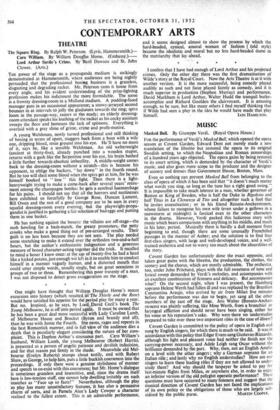MUSIC
Masked Ball. By Giuseppe Verdi. (Royal Opera House.) FOR the performance of Verdi's Masked Ball, which opened the opera season at Covent Garden, Edward Dent not merely made a new translation of the libretto but restored the opera to its original Swedish setting, to which the Neapolitan and Roman censorships of a hundred years ago objected. The opera gains by being restored to its court setting, which is demanded by the character of Verdi's music, and also gives more scope to the producer and the designer of scenery and dresses than Government House, Boston, Mass.
Even so nothing can prevent Masked Ball from belonging to the class of opera of which it has been said that "it doesn't much matter what words you sing, so long as the tune has a right good swing." It is impossible to take much interest in a man, whether governor of Boston or King of Sweden, who is half the Duke in Rigoletto and half Titus in La Clemenz,a di Tito and altogether such a fool that he invites assassination ; or in his friend Renato-Anckerstroem, whose failure to recognise his own wife (even under a gallows in a snowstorm at midnight) is farcical even to the other characters in the drama. However, Verdi packed this ludicrous story with music which bears comparison with anything in his middle, and much in his later, period. Musically there is hardly a dull moment from beginning to end, though there are some unusually Frenchified passages in the manner of Auber; and the solution is to find four first-class singers, with large and weli-developed voices, and a well- trained orchestra and not to worry too much about the absurdities of the story.
Covent Garden has unfortunately done the exact opposite, and taken great pains with the libretto, the production, the clothes, the scenery and the chorus, which are mostly admirable. The orchestra, too, under John Pritchard, plays with the full sweetness of tone and lyrical sweep demanded by Verdi's melodies, and accompanies with an excellent combination of firmness and delicacy. But accompanies what? On the second night, when I was present, the Hamburg soprano Helene Werth had fallen ill and was replaced by the Brazilian Constantina Araujo, who arrived by air from Milan five minutes before the performance was due to begin, yet sang all the other members of the cast off the stage. Jess Walter (Renato-Ancker- stroem) was plainly suffering, like Mme Werth, from a bronchial or laryngeal affliction and should never have been singing, either for his voice or his reputation's sake. Why were there no understudies prepared to take over these two important roles in the case of-illness? Covent Garden is committed to the policy of opera in English and sung by English singers, for which there is much to be said. It was in accordance with this policy that Edgar Evans sang Gustavus-Riccardo, although his light and pleasant voice had neither the finish nor the carrying-power necessary, and Adele Leigh sang Oscar without the brilliance demanded by the part. Why, then, not an English Amelia on a level with the other singers ; why a German soprano for an Italian role ; and lastly why no English understudies? How are our singers to learn these leading roles if they are not allowed to under- study them? And why should the taxpayer be asked to pay for last-minute flights from Milan, or anywhere else, in order to enjoy an inferior version of the old polyglot operatic performance? These questions must have occurred to many listeners and suggest that the musical direction of Covent Garden has not faced the implications of its own policy or the obligations of those who are largely sub-


































 Previous page
Previous page